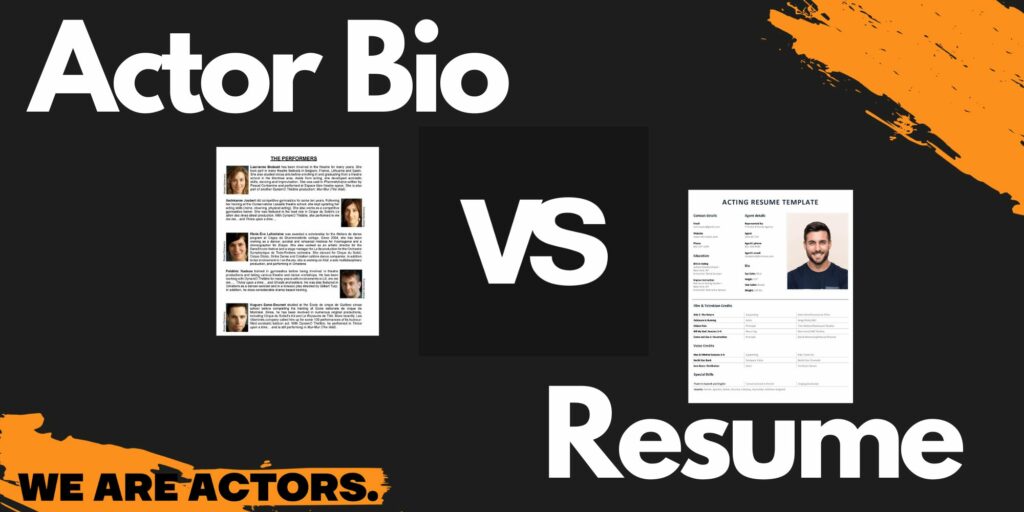
Importance of a Compelling Actor Bio
Welcome to the stage where your journey unfolds! In the limelight of acting, your actor bio is not just a document; it’s your narrative, your unique essence captured in words. It’s where your personal and professional worlds collide, giving the audience a glimpse of the star behind the roles. Here is where you will learn to write the perfect bios for actors.
What is an Actor Bio?
An actor bio is your professional storybook. It’s a blend of your career highlights, personal anecdotes, and the qualities that set you apart in the spotlight. It’s not just about what you’ve done; it’s about who you are as an artist and a person. It’s your introduction before you even step on stage or in front of the camera.
At its heart, an actor bio is your narrative crafted to engage and intrigue. It’s a compelling summary that showcases your journey, your triumphs, and the roles that have shaped your career. It’s your chance to tell the world not just what you’ve done, but how these experiences have sculpted your artistic persona.
How Actor Bios Differ From Resumes

While a resume lists your roles and achievements, your actor bio brings them to life. It’s the color to your resume’s black and white, the story behind the facts. It’s where your personality shines through, making you more than just another name on a casting sheet.
An actor bio and a resume, while both crucial tools in an actor’s arsenal, serve distinctly different purposes and present information in varied ways:
- Narrative vs. Factual Presentation: An actor bio is narrative in nature, telling a story about the actor’s career, personality, and achievements. It offers a comprehensive view of the actor’s journey, aspirations, and the person behind the roles. A resume, on the other hand, is a factual and concise summary of an actor’s professional experiences, skills, and education, typically listed in bullet points or short phrases.
- Personal Touch vs. Professional Overview: Bios allow actors to infuse personal touches, showcasing their unique personality, interests outside acting, and what drives them as artists. This personal angle helps in creating a connection with the reader. Resumes are more professional and straightforward, focusing primarily on career facts without delving into personal anecdotes or characteristics.
- Flexibility in Structure: The bio offers more flexibility in how the information is structured and presented. It doesn’t adhere to the standard chronological format of a resume and can be creatively tailored to highlight particular aspects of an actor’s career or personality. In contrast, resumes follow a more rigid structure, focusing on clear, chronological listings of work experience and training.
- Purpose and Usage: Bios are often used for promotional purposes, such as on personal websites, in program booklets, or social media, aiming to engage a wider audience including fans and potential collaborators. Resumes are primarily used for job applications, targeting casting directors and agents with specific details pertinent to getting a role.
Understanding these differences is vital for actors to effectively use each tool to their advantage in various professional contexts.
The Essentials of a Great Actor Bio: Crafting Your Professional Story
Creating an actor bio that resonates with your audience and industry professionals is both an art and a science. It’s about finding the perfect balance between professional achievements and personal charisma. Let’s explore the key elements to include and how to strike that harmony.
Key Elements to Include in Your Actor Bio
- Career Highlights and Achievements: Start with your most notable acting roles, awards, or recognitions. This sets the stage for your professional caliber.
- Training and Education: Mention your notable acting schools, well known teachers you have trained with
- Unique Skills and Talents: Do you have a special skill like dialects, martial arts, or dance? Highlight these to showcase your versatility.
- Noteworthy Personal Experiences: Share important life experiences that have led you to here.
Balancing Professional Tone with a Personal Touch
- Inject Personality: Your bio should reflect your individuality. Add a personal anecdote or a fun fact to make your bio relatable and memorable.
- Maintain Professionalism: While being personal, ensure the tone remains professional. Avoid overly casual language or slang.
- Tell a Story: Frame your career and personal experiences as a narrative. This makes your bio engaging and gives readers insight into your journey.
Remember, your actor bio is more than just a document; it’s the story of your artistic journey. It’s where your unique path as an actor shines through, capturing the essence of who you are both on and off the stage.
Step-by-Step Guide to Writing Your Bio
Pre-Writing: Gathering Your Material
- Reflect on Your Journey: Think about your career milestones, notable roles, and unique experiences.
- Compile Your Achievements: List down your acting credits, awards, and any special training or workshops you’ve attended.
- Personal Anecdotes and Passions: Identify personal stories or hobbies that have influenced your acting career.
Drafting Your Bio: Structure and Style Tips
- Start with a Strong Introduction: Begin with an attention-grabbing opening that highlights your unique actor persona.
- Chronological Journey or Thematic Approach: Decide whether to structure your bio chronologically or around themes such as versatility, specific genres, or a unique acting method.
- Incorporate Your Professional Highlights: Detail your most significant roles, awards, or experiences that showcase your talent and skills.
- Add a Personal Touch: Weave in personal stories or hobbies to make your bio more relatable and engaging.
- Conclude with Current and Future Endeavors: End with what you’re currently working on and your aspirations.
- Edit for Clarity and Style: Ensure your bio is concise, clear, and free from jargon. Make it accessible to a broad audience.
- Seek Feedback: Have peers or mentors review your bio and provide constructive feedback.
Your actor bio is a narrative of your artistic journey, a blend of your professional triumphs and personal story. It’s an opportunity to showcase your uniqueness and connect with your audience on a deeper level.
Crafting a Captivating Opening
Start Strong
It should be engaging
- Use a compelling fact
- An intriguing anecdote
- Poignant quote that captures the essence of your acting journey.
Be Authentic
Be true to you
- Let your true self come through.
- Authenticity connects with readers more than anything.
Narrative Hook
Intrigue to keep them reading
- Draw your audience in with a narrative that makes them eager to read more.
Examples of Engaging Opening Sentences
“From the moment I stepped onto the stage at age five as a mischievous Munchkin in ‘The Wizard of Oz,’ I knew acting was my calling.”
“Known for bringing a touch of the unconventional to every role, I’ve always believed in pushing the boundaries of traditional acting.”
Highlighting Your Acting Experience
Your acting experience is the cornerstone of your bio. It’s important to structure it in a way that highlights your versatility and achievements.
Structuring Your Acting Credits
Chronological vs. Thematic Organization: Choose whether to present your roles in chronological order or grouped by theme or type (e.g., stage, film, television).
Highlight Key Roles: Focus on roles that have shaped your career or received acclaim.
- Diversity in Characters: Showcase the range of characters you’ve portrayed, demonstrating your versatility.
- Awards and Nominations: Mention any accolades or nominations to highlight your industry recognition.
- Special Skills and Training: Include any unique skills or specialized training that sets you apart.
Actor Bio Examples
Example 1: Michael Johnson
Michael Johnson has captivated audiences with his powerful performances on both stage and screen. Trained at the Royal Academy of Dramatic Art, Johnson’s career began in London’s West End, where he shined in productions like “Hamlet” and “The Phantom of the Opera.” Transitioning to film, he garnered critical acclaim for his roles in “The Timekeeper” and “Eternal Shadows.” Known for his versatility and depth, Johnson continues to be a sought-after actor, recently starring in the blockbuster “Skyward Bound.” Off-screen, he is an advocate for arts education and enjoys mentoring young actors.
Example 2: Emily Clarke
Emily Clarke, celebrated for her dynamic range and emotional depth, has been a prominent figure in Hollywood for over a decade. A graduate of Juilliard, Clarke made her debut in the indie hit “Whispering Winds,” earning her an Independent Spirit Award nomination. She rose to fame with her portrayal of Elizabeth Bennett in the critically acclaimed adaptation of “Pride and Prejudice.” Clarke is also known for her powerful performance in the TV series “Chronicles of the Crown,” which earned her an Emmy. Beyond acting, she is actively involved in wildlife conservation efforts.
Example 3: Raj Singh
Raj’s career spans over 20 years, known for his chameleon-like ability to transform into diverse roles. With a rich background in both theatre and film, he’s appeared in everything from Bollywood blockbusters to indie films like “Journey of the Mind”. Raj also directs community theater, sharing his love for storytelling. In his free time, he enjoys writing poetry and practicing yoga.
Celebrity Actor Bios
Gloria Reuben

Gloria Reuben is an actress, singer and published author whose impressive credentials in television, film, theater and music include portraying the HIV+ physician assistant Jeanie Boulet on the hit NBC series ER (a role that garnered her two Emmy nominations and a Golden Globe nomination) and many other television series including Raising The Bar, Falling Skies, Marvel TV’s Cloak & Dagger, City On A Hill and The First Lady.
Gloria completed her role as Krista Gordon (the therapist to Rami Malek’s Elliot Alderson) in the hit TV series Mr. Robot. As Rolling Stone wrote in their review of the Mr. Robot series finale: “…what makes the scene so powerful are the performances by Rami Malek and Gloria Reuben (who delivers a masterclass in how to convey so much information while making it feel emotionally resonant).”
In film, Gloria portrayed Elizabeth Keckley alongside Daniel Day-Lewis & Sally Field in the Steven Spielberg film LINCOLN, appeared with Paul Rudd and Tina Fey in Paul Weitz’s Admission, and starred opposite Samuel L. Jackson in Reasonable Doubt. Gloria’s portrayal of Condoleezza Rice in David Hare’s play Stuff Happens at The Public Theater in NYC garnered her a Lucille Lortel Award for Best Actress.
In music, Gloria’s career includes being a backup singer for Tina Turner in 2000, which led her to record her solo record Just For You. Gloria released her first jazz album Perchance To Dream in 2015 on the iconic Mcg Jazz label, and her new album For All We Know was released on Valentine’s Day 2020, again on the Mcg Jazz label, to rave reviews.
Gloria’s non-fiction book My Brothers’ Keeper: Two Brothers. Loved. And Lost. (an intimate tribute to her two brothers who have passed away) was published by Post Hill Press in November 2019.
Chris abbott

Christopher Jacob Abbott is an American actor. Abbott made his feature film debut in Martha Marcy May Marlene (2011). Abbott’s other notable films include Hello I Must Be Going (2012) and The Sleepwalker (2014). In 2015, Abbott starred as the titular character in the critically acclaimed film James White. In 2017, he starred opposite Joel Edgerton in the psychological horror film It Comes at Night. In 2018, he portrayed astronaut David Scott in the film First Man, and a reporter in Vox Lux. Abbott portrayed John Yossarian as the lead role in the 2019 miniseries Catch-22 based on the Joseph Heller novel of the same name, for which he was nominated for the Golden Globe Award
We hope you enjoyed this article on how to write an actor bio. Crafting an actor bio requires a blend of personal storytelling and professional insight. It should highlight your unique talents, experiences, and training while remaining engaging and relevant to your audience. Remember to focus on your skills and notable achievements, and use an active voice for clarity and impact. Avoid introducing new information in the conclusion and instead, reinforce the key aspects of your journey and aspirations as an actor. By following these guidelines, your actor bio will not only reflect your professional journey but also captivate and resonate with your audience.







